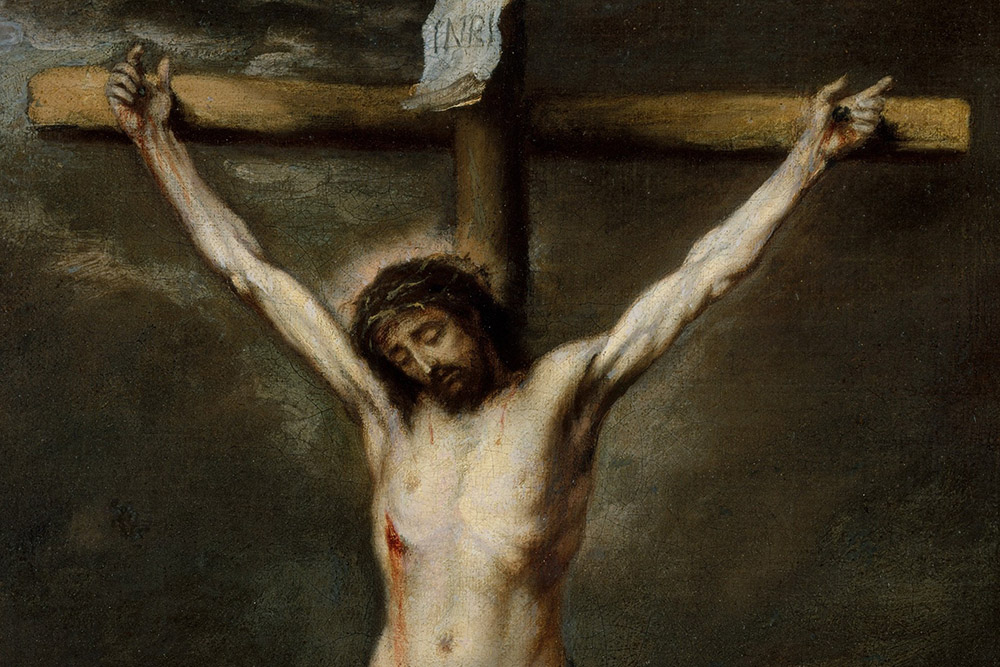
"The Crucifixion" (circa 1675, detail) by Spanish artist Bartolomé Estebán Murillo (Metropolitan Museum of Art)
Today is the answer to any and every attempt to reduce the Gospel to a program of human advancement or ethical achievement. That answer, which is God's answer, is no. Our goals and our methods are not God's goals nor his methods.
Today, we see what a dreadful price the Incarnation exacted from the man from Nazareth. The Son of God became man, and not only dwelt among us, he took on the most ignominious form of human suffering imaginable. That price, which is God's price, is priceless.
Today, we see evil winning the day, nailing to the cross the hands and feet of the one who preached mercy and forgiveness, crowning his head, so often bowed in prayer, with thorns, covering in scorn and blood the rabbi who scorned none but the self-righteous.
Today, we see the one who told Pilate his kingdom is not of this world subjected to the injustices of this earthly realm.
Today, we see death, the one evil no human can conquer, declaring victory over this Jesus.
Jesus is exposed as a false prophet. His ministry comes to nothing. His followers flee. He was no Messiah. He had claimed he would rebuild the great temple in three days, but he lasted only three hours on the cross and the temple still stood. He had called on God as his father, but God did not rescue him from the cross. He was abandoned by all, even by God.
When we try to imagine the sufferings of Jesus, we are at a disadvantage because we know that Good Friday is not the end of the story. His followers did not know what we know. His mother might have had an intimation: There is a tradition that Holy Saturday is a Marian day because she alone among his followers kept the faith in her heart. Today, 2,000 years on, we have trouble imagining the horror of Jesus' followers at what had transpired.
Advertisement
The fear of death is the fear of loneliness and nothingness writ large. Our lives find meaning in the relationships that sustain us, but death brings those relationships to a final and complete end, an absolute loneliness. Whatever accomplishments we achieve can only continue beyond the grave if someone else takes them up; our lives can seem meaningless, an abysmal nothingness.
With Jesus, whose ministry embodied the words of the psalmist — "With the Lord there is mercy and the fullness of redemption" — his death confirms the victory of existential loneliness and nothingness.
In her wisdom, the church provides a liturgy that helps us appropriate some of the desolation the apostles felt, as we discussed on Wednesday. As well, today we hear from John's Passion, layered with meaning, littered with theological grace notes, all of them seminal: Mary and John at the foot of the Cross; Pilate's enigmatic, laconic question, "What is truth?"; the complicity of the anonymous crowd; the pierced side and unbroken bones.
On Palm Sunday, the church gives us whichever synoptic Passion account is in the lectionary cycle, but today, Good Friday, we always listen to the Passion according to John. And we ponder.
The account in the synoptic Gospels and in John's, for all their many differences, come together in the fact of Jesus' death. There is no doubt about this. From the beginning, any kind of Christian spiritualism that denies the importance of the human body was doomed to fail.
Even when we strive to find a cure for cancer, the cross teaches us that God's grace is present in the suffering of the cancer patient, not only in the cure. He is present, too, in our suffering of soul.
However, the death of Jesus, this hideous death, does more than prevent a misguided, gnostic understanding of Jesus and, just so, of the human person. The death of Jesus gives to those of us who claim to follow him a deeper understanding of suffering. It is redemptive, inescapable and redemptive.
In our day, happily, we have conquered many of the diseases that caused previous generations to suffer. The diseases of the soul — greed, gluttony, sloth, malice, envy, lust and pride — these are more resistant to treatment. We shall never conquer them and it is hubris, the deadliest of the seven deadly, to presume to think we can.
The cross gives us a deeper lesson, however: Even when we strive to find a cure for cancer, the cross teaches us that God's grace is present in the suffering of the cancer patient, not only in the cure. He is present, too, in our suffering of soul, present as the just judge whose mercy outstrips his justice.
In our culture, we are taught to seek success. The supposed meritocracy enshrines success in its mythology. But as the Swiss theologian Hans Urs von Balthasar observed, the cross teaches us that success is not a name of God. It is not a Gospel category. Good Friday is the day when we recognize both our reliance on God's grace and the price that was paid for God's grace.
Those of us who correctly admire Pope Francis for returning mercy to a central place in the proclamation of the Gospel need this reminder more than the rest. Yes, God is merciful. But what a dreadful price his Son paid so that we might recognize and receive his mercy!
Today, Good Friday, let us look upon the cross and, as the words of the haunting, painful, beautiful spiritual instruct us, tremble, tremble, tremble.








